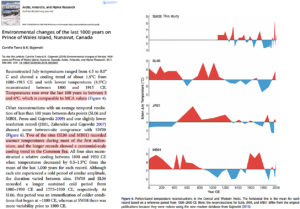by K. Richard, December 16, 2019 in NoTricksZone
Four reconstructions from the central and western High Arctic reveal July temperatures were about 1-2°C warmer than today during most of the 1st millennium and Medieval period (Tamo and Gajewski, 2019).
A few years ago, a chironomid reconstruction of Boothia Peninsula in the Canadian Arctic (Fortin and Gajewski, 2016) revealed not only were today’s temperatures the coldest of the last 7000 years, but the last 150 years “do not indicate a warming during this time.”
…

by Samuel Furfari, 16 décembre 2019 in ConnaissanceDesEnergies
La COP25 vient de se terminer avec, comme chaque année, une avancée minime dans la bureaucratie que créé les Nations unies. Dans le même temps, l’Union européenne affirme son intention d’atteindre la neutralité carbone en 2050, c’est-à-dire de vivre dans un équilibre entre les émissions de carbone et l’absorption desdites émissions par des puits de carbone. De l’aveu même du Parlement européen(1), aucun puits de carbone artificiel n’est toutefois en mesure d’éliminer à ce jour le carbone de l’atmosphère à l’échelle nécessaire…
Ce qui est annoncé au niveau européen – sans l’accord de la Pologne qui défend son charbon – est donc en pratique un abandon des énergies fossiles. Notons ici que les hommes politiques ne s’embarrassent pas de la nuance entre neutralité carbone et décarbonation (ne plus émettre de CO2).
…
by P. Homewood, December 16, 2019 in NotaLotofPeopleKnowThat
A marathon UN summit wrapped up Sunday with little to show, squeezing hard-earned compromises from countries over a global warming battle plan that fell well short of what science says is needed to tackle the climate crisis.
The COP25 deal “expresses the urgent need” for new carbon cutting commitments to close the gap between current emissions and the Paris treaty goal of capping temperature at below two degrees, host country Spain said in a statement.
“Today the citizens of the world are asking for us to move ahead faster and better, in financing, adaptation, mitigation,” Carolina Schmidt, Chilean environment minister and President of COP25, told the closing plenary.
Following a year of deadly extreme weather and weekly strikes by millions of young people demanding action, negotiations in Madrid were under pressure to send a clear signal that governments were willing to double down.
The summit — moved at the last minute from Chile due to unrest — at times teetered on the brink of collapse as rich polluters, emerging powerhouses and climate-vulnerable nations groped for common ground in the face of competing national interests.
“Based on the adopted text, there is a glimmer of hope that the heart of the Paris Agreement is still beating,” said Mohamed Adow, Director of Power Shift, referring the treaty inked in the French capital.
“But its pulse is very weak.”
…
See also COP25: N Climate Talks Collapse
See also : My Thoughts: Post-Madrid #COP25
See also : UN Climate Summit Flops As Nations Deadlock On Hot-Button Issues
La géologie, une science plus que passionnante … et diverse

